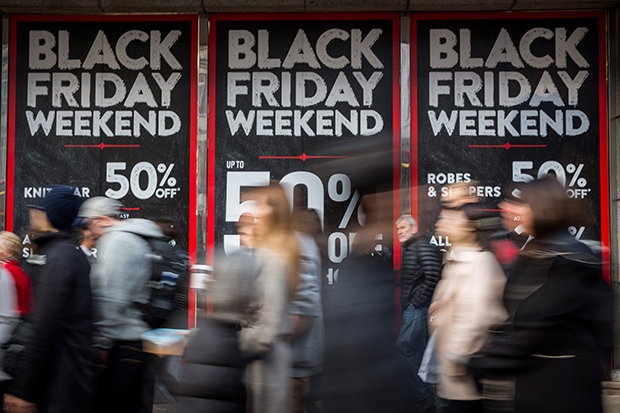The veneer of civilisation is easily cracked, as anyone who has followed Donald Trump’s Twitter feed will know. This Friday, the day after Thanksgiving, the point of which is no longer clear, there will be riots in shops across the globe, as people fight over discounted products they do not need or even want. The returns rate for goods bought on Black Friday is very high, which does not surprise me. This kind of shopping is a very pure narcotic, and it ebbs fast and wild.
Black Friday, Cyber Monday, Boxing Day — capitalism has its own liturgical calendar now. Festivals are essential to humans; and as the sky shrinks and the advertising hoardings get larger and more grotesque, where can we turn but to Asda?
Actually, not Asda. There was so much violence in Asda last year — including a ‘stampede’ in Belfast, a city I always thought could look after itself — that they have ceased Black Friday operations due to ‘shopper fatigue’. The ‘stampede’, hopefully, will return next year.
Here I pause and wonder: is it possible that the Asda ‘non-Black Friday’ or ‘anti-Black Friday’ is an advertising campaign in its own right? Always differentiate yourself from your rivals! As in — ‘Asda: for a non-violent shopping experience’. Or ‘Asda: no one will break your nose at the till’.
Black Friday is not really consumer-driven, although if you ask someone if they want cheaper products they will usually say yes. But not me; not when the product is human. I do not want a discounted Black Friday cleaner, although I was offered one by email, and neither should you. If you consider it, slap yourself, or go to Tesco on Black Friday, where someone else will do it for you.
It is above all free advertising — as ‘Grisly and Disgusting Death in Disney World’ is still free advertising for Disney World (you’re welcome) — and for newspapers, awash with ‘churnalism’, it is free content; although, to be just, the January and July sales never came with a riot. Newspapers, ever in denial about their own malice, warn of carnage while providing countdown clocks to the carnage. I love a countdown clock, but not to a stranger’s death. There is a website called blackfridaydeathcount.com detailing shootings, stampedes and car crashes.
Are people angrier now? More covetous? Or, with relative peace in the West, is there nothing better to fight over than TVs, trainers and, I hope, because I love irony, Christmas decorations? I think the branding of capitalism, so sagely and cynically, as ‘freedom’ is essential when analysing Black Friday. You are not ‘box-wrestling’ your fellow for a TV because you are a cretin. It is in the cause of freedom. I also think it is important that the greatest public disorder of the Cameron age occurred in the alleys of Foot Locker. Bread riots. Shoe riots. It is arguably progress.
It is also a new genre of entertainment, which lingers somewhere between shopping, fighting and watching TV. You can participate in Black Friday; or you can watch it online as spectator sport called ‘Head Injury in Electricals’, or ‘That Bra is Mine’.
It is impossible to watch the footage of Black Friday 2014 without thinking of The Hunger Games, or even Gladiator: ‘My name is Maximus Decimus Meridius and I want a Bosch washing machine. Not a Hotpoint. Eat my fists.’ There were ‘disturbances’ in seven separate Tescos last year. A woman broke her wrist. Another was hit by a falling television.
The police were appalled and tweeted, drolly, with hashtags — which missed the point, as hashtags are advertising — in between breaking up fights: ‘Even on #BlackFriday shoving people to the floor so you can get £20 off a coffee maker is still an assault.’
Civilisation, I suspect, will endure. The day after Black Friday, one hundred bookshops will participate in Civilised Saturday and will offer cake, prosecco, and singing. You could call Civilised Saturday a light in the darkness of a late-capitalist night; or you could call it another feast day in the calendar of consumption, but more middle-class, and therefore nothing to mock. You are the consumer. You choose.







Comments